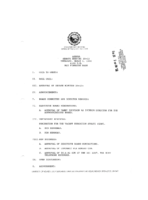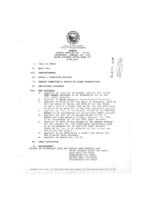Search the Special Collections and Archives Portal
Search Results

Blue Angel Motel Neon Survey document, August 12, 2017
Date
Archival Collection
Description
Site address: 2110 Fremont St
Sign owner: Bartsas Mary 22 LLC
Sign details: Motel was originally constructed c. 1956. Sits on a 2.54 acre site. Property was later changed to Club 2110, but now is vacant.
Sign condition: Unknown - Angel is being repaired by City Centennial Commision and YESCO, and will believed to be placed on medium of Fremont and Charleston once restored. 4 - Arches were repainted at unknown time from original blue to a deep forest green, "Blue Angel" was removed and "Night Club" was put up in blue angels place. "Motel" wording on flag portions of the sign was painted over and replaced with "Club 2110". doesn't have any form of lighting, appears to be in decent condition.
Sign form: Angel - Sculpted Pole Sign/ Monument Sign, Arches: Pole sign with protruding arches on either side. Originally the left side arch would have rested on the Blue Angel motel building, but when it was torn down so was the connection, so it is free hanging off the pole support system.
Sign-specific description: Angel: Pole sign with sculpture of Angel on top. Was internally illuminated, her skin, hair, halow, pole, wand, used to illuminate. Two flag signs hung off of angel pedestal, one read "Motel" other would read "Blue Angel" on opposite sides of the pole. Would of glowed with blue neon. Arches: Repainted by new owner: Arcs protruding on either side of the pole with the words "Night" and "Club" on each other arches. There are flag like components going down the pole support with stars on the opposite side of each component. Slight directional tool of the flags that point downwards to the ground. The stars do not have any lighting system of their own (no neon or bulbs). Each flag component is double sided with painted on graphics.
Sign - type of display: Neon, and internally illuminated plastic
Sign - media: Steel, fiberglass
Sign animation: Possible rotation of the angel?
Sign environment: The property is surrounded by other motels, shopping centers and gas stations
Sign manufacturer: YESCO
Sign designer: Betty Willis
Sign architect of record: C. 1956
Sign - date of installation: C. 1956
Sign - date of redesign/move: Angel - 2014 repaint, 2017 refurbishment, c. 2014 repaint of arches
Sign - thematic influences: Believed that angel was modeled after Marilyn Monroe
Sign - artistic significance: 1950s pop culture themes - Marilyn Monroe and Disney-esque angel
Survey - research locations: Motel site, www.roadarch.com, UNLV photo collections, assessor's website
Surveyor: Danny Jacobs
Survey - date completed: 2017-08-12
Sign keywords: Sculptural; Neon; Steel; Fiberglass; Pole sign; Internally illuminated; Incandescent
Text

Deryk and Melissa Engelland oral history interview: transcript
Date
Archival Collection
Description
Oral history interview with Deryk and Melissa Engelland conducted by Barbara Tabach on May 23, 2019 for the Remembering 1 October Oral History Project.
Deryk Engelland is a professional hockey player and team spokesperson for the Vegas Golden Knights in Las Vegas. He and his wife, Melissa, discuss the events of the October 1 shooting and how the Golden Knights chose to honor the community that they were representing after this tragic event. Deryk and Melissa Engelland established the Vegas Born Foundation to honor first responders and community heroes, and the couple talks about the organization's accomplishments since its inception.
Subjects discussed include: Las Vegas healing.
Text

Meeting minutes for Consolidated Student Senate University of Nevada, Las Vegas, March 1, 1990
Date
Archival Collection
Description
Text
Regional subject files, 1859, 1908, 1970-2015
Level of Description
Scope and Contents
The regional subject files include materials collected by anthropologist Katherine Spilde about Native American gaming, Native American communities in the United States, and the US and international gaming industries. The materials date from 1859 to 2015, with the bulk of materials dating from 1990 to 2010. Materials dating from the nineteenth and early twentieth centuries are a reproduction of a federal treaty and an ethnohistorical essay. The majority of the materials document Native American gaming following the passage of the 1988 Indian Gaming Regulatory Act. The papers include research and subject files created by Dr. Spilde during her employment with the National Gambling Impact Study Commission (NGISC), National Indian Gaming Association (NIGA), and Harvard Project on American Indian Economic Development (HPAIED). The materials document Native American gaming enterprises both on and off reservations, the socioeconomic impact of gaming, the political history of gaming in the US, and international gaming. The series includes socioeconomic reports, testimonies, correspondence, memos, press releases, photographs, audiovisual materials, promotional materials, brochures, fact sheets, summaries, booklets, pamphlets, advertisements, tourism materials, journal articles, legal briefs, legislative documents, court opinions, notes, presentations, conference materials, periodicals, community newspapers, and newspaper articles.
The collection contains documentation on a number of Native American nations, including the Misi-zaaga'iganiing Anishinaabeg (Minnesota Chippewa Tribe, Mille Lacs Band); Gaa-waabaabiganikaag Anishinaabeg (Minnesota Chippewa Tribe, White Earth Band); Forest County Bodéwadmi (Forest County Potawatomi Community); Ho-Chunk Nation of Wisconsin; Mashantucket Pequot Indian Tribe; Mohegan Tribe of Indians; Tulalip Tribes of Washington; Sisseton-Wahpeton Oyate of the Lake Traverse Reservation; Standing Rock Sioux Tribe of North and South Dakota; Mandan, Hidatsa, and Sahnish (Arikara) (Three Affiliated Tribes of the Fort Berthold Reservation, North Dakota); and Mississippi Band of Choctaw Indians. Other communities are also represented in the series, but to a lesser extent. In addition to materials about gaming and casinos, Dr. Spilde also collected documents, photographs, and audiovisual materials about Native American culture in general. The series documents regional and national trends in Native American gaming, and the greater gaming industry. Materials trace federal and state relationships with individual Native American nations, specifically concerning gaming enterprises.
Archival Collection
Pagination
- Previous page ‹‹
- Page 3
Archival Component

Meeting minutes for Consolidated Student Senate University of Nevada, Las Vegas, February 9, 1989
Date
Archival Collection
Description
Text
Lisa Levine (University of Nevada Regent) oral history interview conducted by Magdalena Martinez: transcript
Date
Archival Collection
Description
From the Lincy Institute "Perspectives from the COVID-19 Pandemic" Oral History Project (MS-01178) -- Elected official interviews file.
Text

Transcript of interview with George Pollak by Claytee White, May 25, 2010
Date
Archival Collection
Description
George was raised in Mattapan, a suburb of Boston, by his mother and father. George had four siblings and was the second youngest. George shares fond memories of growing up and playing softball and tennis in the neighborhood park with his numerous friends. George could listen to a song on the radio and play it on the piano by ear when he was as young as four years old. George had several jobs to earn money growing up, including working in a record store and as a busboy. Eventually George and his brother joined a trio with Steve Harrington and performed in clubs. In 1958, George joined his brother and Paulette Richards in Las Vegas where they had a contract to play at El Rancho Hotel & Casino where they played until it was destroyed by fire. Following the fire, George and his brother parted ways and each did their own thing. In the 1960s, George began playing with the band at Caesars Palace. George used his background in accounting to do some bookkeeping and payroll for some of the ban
Text

Meeting minutes for Consolidated Student Senate University of Nevada, Las Vegas, January 20, 1993
Date
Archival Collection
Description
Text

Transcript of interview with Willie Jones, James Jones, and Jamet Jones by Robbin Mc Laurin, March 5, 1980
Date
Archival Collection
Description
On March 5, 1980, collector Robbin McLaurin interviews three members of the Jones family, Willie, James, and Jamet Jones (born 1923, 1920, and 1961, respectively) in the Jones home. Mr. and Mrs. Jones were born in Forest, Mississippi, and relocated to Las Vegas, Nevada, for employment related purposes. This interview covers Las Vegas, past and present.
Text

